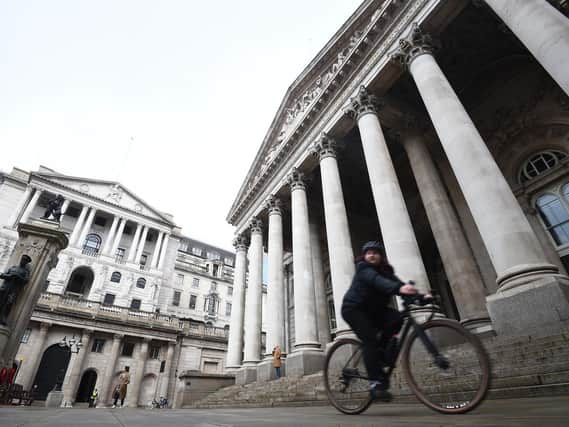How can the Bank of England stop inflation rising? - James Rowbury


Inflation in the UK rose sharply in June to 2.5% which begs the question ‘what will the Bank of England (BoE) do to prevent inflation from spiralling away?’
With the pandemic fallout leaving mounting debt burdens at corporate and governmental level, most believe the BoE’s policymakers will retain a loose policy for some time. On the contrary, two of its nine members this week showed support for a sooner-than-expected interest rate tightening.
Advertisement
Hide AdAdvertisement
Hide AdPaul Dales, Chief UK Economist at Capital Economics, challenged the BoE’s view that the rise in prices was simply a case of price cuts during the pandemic reversing. With more persistent and widespread price increases evident, the figures showed “genuine price inflation is happening too,” he said in a company press release.
UK inflation has recently followed the same path as in the US, where the Consumer Price Index (CPI) rose at an annual rate of 5.4%in June. It is expected that inflation may rise further to 3% by the end of 2021 when the temporary reduction of VAT on hospitality ends, combined with higher gas and electricity prices, while the reopening of the economy will add to the inflationary pressure.
In global markets, a surge in foreign ownership of Chinese stocks and bonds has taken place, with US$800bn now held. According to Financial Times calculations based on Bloomberg
data, offshore investors have bought a net US$35.3bn of Chinese stock thus far in 2021 via trading platforms linking Hong Kong with exchanges in Shanghai and Shenzhen.
Advertisement
Hide AdAdvertisement
Hide AdThis is a 49% increase compared with the previous year. In addition, foreign investors have also bought around US$75bn of Chinese bonds this year as per figures from Credit Agricole, showing a 50% increase from 2020.
The appetite for Chinese assets highlights the uneven nature of the global recovery and the swift rebound of the Chinese economy amidst the multitude of disruptions facing developed markets. It should be noted that China’s economic recovery for the second quarter of 2021 demonstrated a more modest level of 1.3%, and we may expect to see China adding policy support to encourage business and build confidence.
Closer to home in Yorkshire, PureGym is planning to raise equity in public markets as it returns to growth after restrictions on gyms were lifted in April. The company was hit hard by lockdown restrictions last year, however, it has recovered with a steady increase in members. As of 30 June, PureGym reached 1.57m members, up from 1.46m reported in December 2019 and reflecting 92% of its 2019 figure of 1.7m, indicating that the company is recovering after the pandemic.
Please note that investments and income arising from them can fall as well as rise in value. This communication is for information only and does not constitute a recommendation to buy or sell the shares of the investments mentioned.
By James Rowbury, Investment Research Lead, Redmayne Bentley